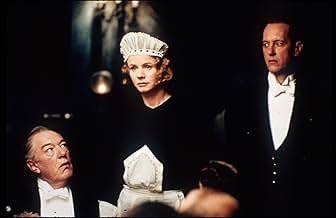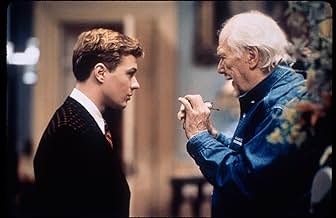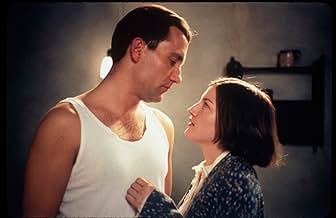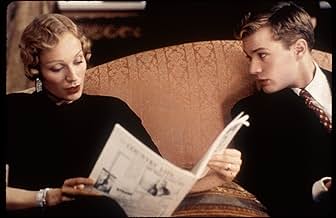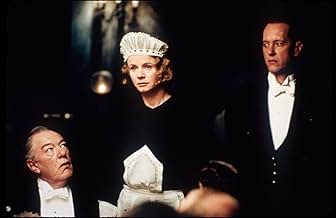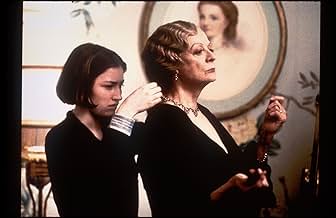En una casa de campo inglesa alguien ha sido asesinado. Los invitados en los pisos de arriba y el servicio en los de abajo investigan este crimen del que uno de ellos es culpable.En una casa de campo inglesa alguien ha sido asesinado. Los invitados en los pisos de arriba y el servicio en los de abajo investigan este crimen del que uno de ellos es culpable.En una casa de campo inglesa alguien ha sido asesinado. Los invitados en los pisos de arriba y el servicio en los de abajo investigan este crimen del que uno de ellos es culpable.
- Dirección
- Guionistas
- Elenco
- Ganó 1 premio Óscar
- 36 premios ganados y 74 nominaciones en total
- Dirección
- Guionistas
- Todo el elenco y el equipo
- Producción, taquilla y más en IMDbPro
Opiniones destacadas
What was surprising was the level of humour that Altman brings to what is, as it unfolds, a very sad story of transgression and loss. Maggie Smith has all the funniest lines as a viscious but impoverished woman who comes to her family with begging cap in hand. Those playing characters "above stairs" all look and sound the part and effortlessly give the impression of wealth and privelege and the callousness that breeds.
Many of the "downstairs" characters drive the story and there are some wonderfully wry performances from the likes of Richard E Grant and Alan Bates. As the moral centre of the film, Kelly McDonald is excellent and is well matched by Emily Watson as Emily and Clive Owen as Parkes. Ruling the downstairs troop is Helen Mirren whose cool visage hides a seething mass of emotion. A well deserved nomination here.
Only Robert Altman could assemble a cast of this magnitude and distinction and have many of them speak no more than a few lines ! Greats of English theatre like Derek Jacobi have small but memorable roles and there is not a bad note struck from any of the predominantly English cast.
I was slightly puzzled by the character played by Ryan Phillipe (although his perforamce was fine) but felt that the intrusion of two Americans into this English mix worked well to highlight the entrenched class roles played by everyone in the house.
Whilst perhaps not his best work, this is a very good Altman film - we move in and out of conversations whilst never losing their import and the cimematography has a fluidity that few other film makers can match.
A classy piece of film-making that rewards careful attention from the viewer.
Altman's preferences for kaleidoscopic social observation has sometimes failed in the past due to the weight of its own ambition: multi-plotted and multi-charactered snapshots of time and place held together by loose ties or a general thematic framework. Sometimes it pays off spectacularly (Nashville); sometimes it flatters to deceive (Short Cuts).
It works well here due to the necessary discipline of the single location and the greater opportunities for interaction among the characters this affords. Add to that an exemplary cast of (mostly) British character actors and a knowing script by Julian Fellowes that gives Altman's keenly observant camera plenty of time to make its own points.
Rightly, Altman is less concerned with the murder mystery, which is almost an aside, than with the opportunity given by a shooting party at a 1930s stately mansion to observe the English aristocracy and their servants in social interaction.
Never happier than when involved in a bit of human anthropology, Altman lightly dissects the complexities and hierarchies which go on both above and below stairs; in which many subtle and unsubtle rituals are played out among groups of people who clearly dislike each other but are forced through circumstance, need or employment to observe the fundamental social practices required.
1932 is also a time of intruding change into the nature of the old English ruling classes, slowly disintegrating in this between-wars period and, in this case, largely reliant on the wealth of one particularly reluctant patron to keep them in furs and flunkies. In on this act comes the (to them) faintly odious whiff of 20th century new money, represented by Hollywood and popular culture. These intruders are kept in their place, but the message is clear - change is coming, and coming fast.
The muted colours and autumnal setting continue this theme of a world in terminal decline and of a group of characters keenly conscious of place and tradition yet also wearied and exhausted by it. Only at the very end, when fundamental change has occurred and many characters are left to face up to very different destinies do we see a bit of sunshine creeping in, heralding the dawn of a new era.
The cast are all excellent, with special mention deserving of Maggie Smith's effortless scene stealing as a bitchy but broke old Countess; the ever reliable Jeremy Northam as matinee idol Ivor Novello, well aware of his place in the great scheme of things and young Kelly Macdonald in the pivotal role of Smith's harassed maid who's inquisitiveness rattles a whole load of family skeletons.
My plot summary suggests that this is a sort of murder mystery and that this will act as the driving force behind the narrative, however this is not the case and in reality the film is much more about the characters and relationships than it is about the murder. To this end the film will annoy some people who are perhaps not used to the sort of film that Altman produces and will be looking for the mystery aspect to be the all. However, I found the rather free-wheeling ensemble approach to be very enjoyable and the first hour moved quickly by thanks to the natural interactions and relationships and it was actually the mystery aspect that didn't work as well because it required too sudden a change in pace a change that the material seemed to resist and hamper. Despite this it does still work mainly because the Oscar winning writing brings out such convincing relationships and social politics, making it enjoyable and interesting throughout. The direction is great; the use of two cameras in group scenes means that the actors seem to flow around as naturally as their dialogue would suggest few seem forced to act to a fixed point and seem more realistic.
Considering the talent on board, it is not surprising that nobody really upstages anyone in particular and the ensemble feel is strong. Smith, Gambon, Thomas, Dance, Northam, Balaban and others make the upstairs fizzle with snobbery and unspoken resentments. Meanwhile the downstairs staff are just as well drawn and delivered by Mirren, Owen, Jacobi, Watson, Bates, Grant, Atkins and others. Stephen Fry is fairly minor within the plot but he is delightfully comic, even if he doesn't quite fit into the film that well.
Overall this is a classy film very much in the Altman style an ensemble piece of characters and relationships that we are left to drift within. Some viewers will find it frustrating that it takes so long to get to the point where the mystery kicks in but I actually found this to be the weaker aspect of the film and the most enjoyable parts were the well written characters and dialogue, which deservedly won Fellowes his Oscar.
The story moves on as the characters begin to establish their names and the audience learns their varying social status. The intertwining stories among the guests begin to surface and the audience begins to realize there is much more in this house than what meets the eye.
During the night one member of the elite group is killed. None of the guests seemed to be fazed by this event and are only upset by the inconvenience it sets up for their lives.
The only one troubled is Constance, Countess of Trentham's maid, Mary (Kelly McDonald). The story begins to focus on Mary, who discovers secrets among the visitors and leads the audience to solve the mystery.
The great aspect about this film is Robert Altman's abilities to bring the past to life. He pays excellent attention to detail and is able to recreate the feelings and morals during the time period. He emerges the audience into a film world filled with history and story. Throughout the film Altman visually shows the audience the contrast between social classes through his various shots, lighting techniques, and camera filters. His fluid camera movements visually portray foreshadowing and relationship among characters. These elements give the audience a complete understanding of the mood and atmosphere in the film.
I recommend this movie to anybody who has the patience to sit and focus on this excellent film. Although the beginning is appropriately slow moving and the characters names are difficult to remember, the payoff is worth the efforts. This movie is made for active film viewers and all Robert Altman fans.
The acting is superb, and this is a movie that really benefited from its great actors. Too often people will praise the acting of a film just because it has famous people in it, even of their talents weren't fully utilized for the characters they portrayed. But these characters were complex and it was those subtle aspects of the acting, the brief facial expressions, tones of voice, and other details that took the film to the next level.
Interesting character studies, an enticing mystery, a bit of humor, an homage to classic detective films, and a drama that gives you a glimpse of a very specific little world, one that you're probably not accustomed to. Those are the things you can expect from Gosford Park, and I highly recommend it.
¿Sabías que…?
- TriviaThe camera is always moving (if only slightly) in every shot as requested by producer and director Robert Altman.
- ErroresThe movie takes place in 1932 but some of the songs Ivor Novello sings for the guests didn't come out until years after, like "Glamorous Night" (1935), "Why It Wasn't You" (1937), "I Can Give You a Starlight" (1939) and "Waltz of My Heart" (1939).
- Citas
[Morris Weissman is asked about his upcoming movie project]
Lady Sylvia McCordle: Mr Weissman.
Morris Weissman: Yes?
Lady Sylvia McCordle: Tell us about the film you're going to make.
Morris Weissman: Oh, sure. It's called "Charlie Chan In London". It's a detective story.
Mabel Nesbitt: Set in London?
Morris Weissman: Well, not really. Most of it takes place at a shooting party in a country house. Sort of like this one, actually. Murder in the middle of the night, a lot of guests for the weekend, everyone's a suspect. You know, that sort of thing.
Constance: How horrid. And who turns out to have done it?
Morris Weissman: Oh, I couldn't tell you that. It would spoil it for you.
Constance: Oh, but none of us will see it.
- Créditos curiososThe cast credits at the end are separated between above stairs, visitors and below stairs, arguably listed in order of status within the British class system.
- ConexionesFeatured in Siskel & Ebert & the Movies: The Best Films of 2001 (2001)
- Bandas sonorasWaltz of My Heart
Performed by Christopher Northam
Composed by Ivor Novello & Christopher Hassall (as Christopher V. Hassall)
© Chappell/Music Limited
By Kind Permission of Warner/Chappell Music Ltd
Selecciones populares
Detalles
- Fecha de lanzamiento
- Países de origen
- Sitio oficial
- Idiomas
- También se conoce como
- Gosford Park
- Locaciones de filmación
- Syon House, Syon Park, Brentford, Middlesex, Inglaterra, Reino Unido(interiors: upstairs bedrooms)
- Productoras
- Ver más créditos de la compañía en IMDbPro
Taquilla
- Presupuesto
- USD 19,800,000 (estimado)
- Total en EE. UU. y Canadá
- USD 41,308,615
- Fin de semana de estreno en EE. UU. y Canadá
- USD 241,219
- 30 dic 2001
- Total a nivel mundial
- USD 87,754,044
- Tiempo de ejecución
- 2h 17min(137 min)
- Mezcla de sonido
- Relación de aspecto
- 2.35 : 1



